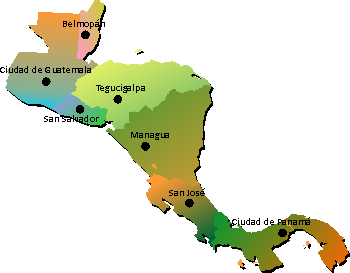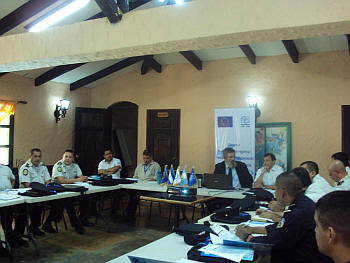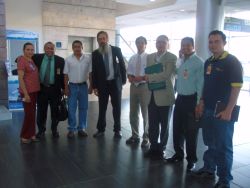First project
2009
Central America (Belize, Costa Rica, El Salvador,
Guatemala, Honduras, Nicaragua, Panama) 2011

In 2011 I was giving for the International
Organization of Migration seven
bi-national workshops for Integrated Border
Management for the staff of the border control point
(BCP) and other administrative personal. These workshops
were taking in consideration the actual situation in the
country and the entire region, which is characterized on
one hand by:
- Drug smuggling,
- Fire arms smuggling,
- Trafficking persons and
- Especially in the northern countries of the
region by armed gangs – the so called Maras;
on other hand there are activities to more
integration in the CA-4 countries -Guatemala, Honduras,
El Salvador y Nicaragua also including the border
security issues.
IOM and OCAM has prepared the program for the
Migration Service, the National Police and the Customs
Service.
Country by country there were variations in the
assistance to the meetings, considering the
different institutions, the hiraquical level of the
participants (boder personal until chiefs from the
Ministry and the local Interpol offices) and the number
of participans generally.
 In
the workshops were evaluated the
specific border control point, usually visited the
day before the meeting, the national, regional and
international level of existing coordination and the
requirements of modern border control systems inside of
concepts for Integrated Border Management.
In
the workshops were evaluated the
specific border control point, usually visited the
day before the meeting, the national, regional and
international level of existing coordination and the
requirements of modern border control systems inside of
concepts for Integrated Border Management.
Additionally to the workshops was elaborated for IO
and the national Migration Services a report, detailing
the findings in the visits on the BCP´s, the level of
cooperation and the needs for data exchange on national,
regional and international level.
The results were presented on 13.12.2011 on the XXXV
Ordinary Meeting of OCAM to the Directors of the
Migration Services of the seven countries.
In the evaluation were also other BCP´s included,
visited in the trip in different countries.
In comparison to the last similar assignment in the
same sector in 2009 was interesting especially the good
advances in Nicaragua.
Should be mentioned, the hosting of the here a linked
page of the project was initially temporary – but
nothing is so permanent in the region as a well running
solution ….
Central America (Costa Rica, El Salvador, Guatemala, Honduras, Nicaragua, Panama)

In spring 2009 I was member of a evaluation and project defining mission of integrated border management in
behavior of the EC in Central America.
In the tasks where included the following countries in alphabetic order:
-
Costa Rica,
-
El Salvador,
-
Guatemala,
-
Honduras,
-
Nicaragua and
-
Panama.
Content of the project was the
elaboration of the EU Project Documentation for a
project in the six countries of Central America,
concerning the border security issues.
The mission was affected by the time
pressure to get the results soon and the time of the
field work. The field work was over Eastern, in catholic
countries a very difficult time to get in touch with
competent counterparts.
Considering these facts the results of
the mission were more snapshot for orientation as a
solid base for a future project.
Very useful for the results of the
mission was the contact with the Interpol Regional
Office Central America. In all field activities was one
representative form the Regional Office present and the
most oft the contacts in the in the visited countries
was organised and supported by Interpol.
 Considering
the lack of information the report was focused in the
restructure of the Border Check Point of Aguas Blancas,
a critical point the North – South movements with cargo,
and in the elaboration of standard control stations
which can be implemented in any place of the 6
countries.
Considering
the lack of information the report was focused in the
restructure of the Border Check Point of Aguas Blancas,
a critical point the North – South movements with cargo,
and in the elaboration of standard control stations
which can be implemented in any place of the 6
countries.
A special interest was focused in the
CA4 countries Nicaragua, Honduras, Guatemala y El
Salvador, considering that border movements for citizen
of these countries to the other country can be done
without passport, using the National ID card.
Also was recognised that the
constructive infrastructure, especially in Nicaragua
needs to be improved, there are still Border Check
Points without real working conditions active, many of
them affected by the Nicaraguan Civil War between 1979
until 1990.
The results were present on the XXIV
Extraordinary Meeting of Chiefs of Police of Central
America, Mexico and the Caribbean.


 In
the workshops
In
the workshops
 Considering
the lack of information the report was focused in the
restructure of the Border Check Point of Aguas Blancas,
a critical point the North – South movements with cargo,
and in the elaboration of standard control stations
which can be implemented in any place of the 6
countries.
Considering
the lack of information the report was focused in the
restructure of the Border Check Point of Aguas Blancas,
a critical point the North – South movements with cargo,
and in the elaboration of standard control stations
which can be implemented in any place of the 6
countries.